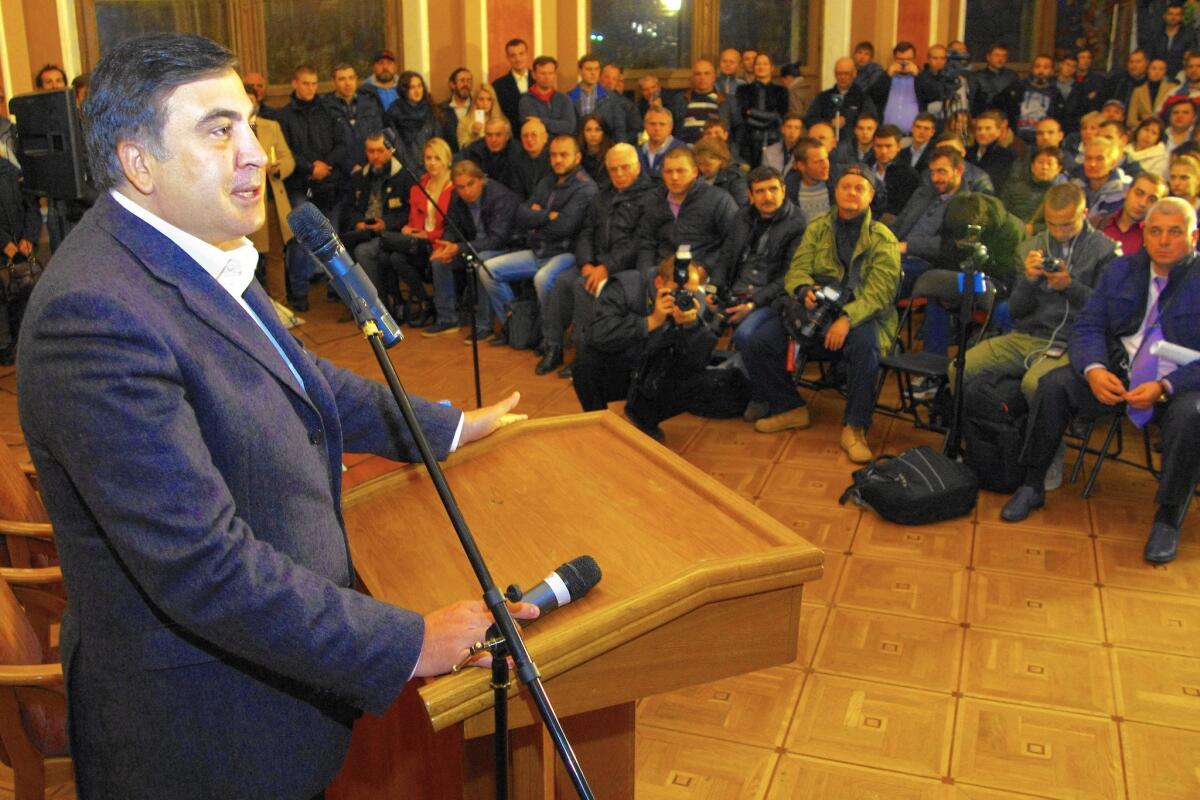Rose Revolution hero runs into a wall of debauchery in Odessa

Odessa Gov. Mikheil Saakashvili, who led the bloodless 2003 Rose Revolution in Georgia, has seen his popularity sputter after an initial dramatic rise in the Ukrainian region.
Reporting from Odessa, Ukraine — When former Georgian President Mikheil Saakashvili was appointed governor of the Odessa region in May, Ukraine’s president and fawning media hailed the brash, Western-educated reformer as the new sheriff in town who would clean up the Black Sea port’s legendary corruption.
You could almost hear the oligarchs laughing.
Six months into the job, Saakashvili has run into the wall of entrenched back-scratching and self-interest that for centuries have typified Odessa’s way of life. He has suffered a major defeat at the ballot box, with his handpicked candidate for mayor last month losing badly to a Kremlin crony — a devil the public knows — and his few bold initiatives aimed at breaking the bribery pandemic have succeeded in constraining the palm-greasing without installing functional alternatives in its place.
Saakashvili gained a reputation in his native Georgia for tough action against criminal gangs and powerful kingpins after leading the bloodless 2003 Rose Revolution against self-serving vestiges of the Soviet era.
But in Odessa, renowned for crime and debauchery since the czarist era, reform has never followed revolution. Instead, old habits die hard and the political careers of those who wish to break them die young.
In his short-lived tenure in the imposing stone gubernatorial headquarters on the outskirts of the city, Saakashvili, 47, has seen his popularity sputter after an initial dramatic rise. Odessites, accustomed to the crooked way goods are shipped and deals are done, complain that things have not changed for the better.
Some say Saakashvili is hobbled because he is an outsider, lacking the local knowledge and relationships crucial to working with the omnipotent business tycoons who dominate commerce in Ukraine’s busiest port. Others blame geography: A city of 1 million, Odessa is Russian in its soul but Ukrainian in the post-Soviet order, and coveted by both the government in Kiev and Kremlin-backed separatists who have already gnawed off Ukraine’s Crimea peninsula and annexed it to Russia.
Saakashvili appeared to score a victory in one of his first challenges to Ukraine’s oligarchy, moving to break up the monopoly of banking and industry magnate Igor Kolomoisky’s regional airlines at the Odessa airport. But his attempt to appoint an independent aviation administration chief to replace a Kolomoisky ally was thwarted by Kiev lawmakers and Cabinet ministers whose political careers are beholden to oligarchs, Kolomoisky first among them.
In all, Ukraine’s top 50 magnates have a combined wealth accounting for 85% of Ukraine’s gross domestic product, according to the Jamestown Foundation’s Eurasia Daily Monitor. And much of that power and money is concentrated in the hands of a mere dozen, including Kolomoisky, whose Privat Group is made up of financial institutions, metalworks, media, petrochemicals and aviation assets.
Ukrainian President Petro Poroshenko, himself a confectionary tycoon-turned-politician, had appointed Saakashvili to the Odessa governorship with the hope of tapping the Georgian’s ability to make government more responsive to the people.
Saakashvili, the president said, had transformed Georgia “in the direction of transparency, effectiveness, anti-corruption, appeal to foreign investors, fair justice, protection of citizens’ rights and democracy.” The Georgian was eventually able to shame Kiev officials into endorsing the breakup of Kolomoisky’s air travel monopoly.
But the victory turned the oligarch’s national television and print media against him. Press attacks are credited with torpedoing the governor’s attempt to propel a reformist ally, Harvard-educated former Microsoft executive Sasha Borovik, into the Odessa mayor’s office. Borovik was trounced in the Oct. 25 election.
Saakashvili’s initial moves to combat corruption have been a lesson in unintended consequences.
“No one ever wanted to stop the smuggling; they just wanted their share,” said Vasily Vesselovsky, whose private equity firm Informall finances shipping operators across the Black Sea. “The shipping business is big money, with big egos involved, so it has always been in the hands of the oligarchs.”
That has allowed the magnates to block efforts at tax reform and modernization of the archaic systems of customs declarations and tariff collection that have been in place since the Soviet era.
Saakashvili and Borovik, who serves as an advisor to the governor, have stumbled in introducing automated programs for assessing duties on the freight that passes through the Odessa waterfront. Promises of same-day billing, payment and clearance of goods have foundered amid the byzantine structure of federal and regional offices where clerks are beholden to political appointees with rival agendas.
Take the Odessa city council’s attempt last year to prohibit the sale of cigarettes and alcohol near schools, recalls Yuri Tkachev, editor of the online local newspaper Timer. Although popular with the community, the bill was scuttled by politicians in Kiev who reserve even minute local government affairs for the federal legislature to decide. “Any effort by Saakashvili to change practices is subject to sabotage from lawmakers and oligarchs who want to maintain the status quo,” Tkachev said.
Some obstacles to reform are deeply ingrained in Odessan culture, he said.
Back in the Soviet era, Odessa was the wild child of the communist giant’s maritime network. More than 700 miles away from Moscow, seagoing captains and shippers played by their own rules, amassing fortunes through contraband smuggling and the sale of fuel and other state-owned property. Bribes and favors worked far better than central planning for getting cargo loaded and unloaded, dockside services hooked up and the tax and customs duties minimized.
Relatively wealthy and still graced with the balmy weather and shaded promenades that inspired Pushkin and Chekhov, Odessa now finds itself the object of a political tug of war. Every few weeks, a bomb goes off outside a police station or security service building, presumed to be provocations by the pro-Moscow separatists eyeing Odessa as the crown jewel in their envisioned corridor along the Black Sea that would link Russia with its forces occupying the Transnistria area on Ukraine’s border with Moldova.
Odessa was the scene of one of the civil war’s bloodiest confrontations on May 2, 2014, when demonstrations by rival supporters of Kiev and Moscow degenerated into running street battles. Scores of pro-Russia demonstrators holed up in a labor union building in the city center. At least 40 people were burned to death when a Molotov cocktail set fire to the ground floor and blocked their escape.
The “ethnic situation” — the fight for eastern territory between Ukrainians and Russians — has calmed down of late, says social scientist Iuliia Serbina with the National Institute for Strategic Studies.
One reason that tension has eased, she said, is that Odessites have witnessed the destruction visited on the east by the conflict that has taken 8,000 lives and concluded that staying out of the fight is their best strategy.
Serbina expressed disappointment in Saakashvili’s performance in office, portraying his tactics as a public relations campaign that isn’t working with jaded locals.
“He gave people hope for change when he first arrived,” Serbina said. “But it would have been nice to see some results. I don’t think he will be here much longer.”
More to Read
Sign up for Essential California
The most important California stories and recommendations in your inbox every morning.
You may occasionally receive promotional content from the Los Angeles Times.











